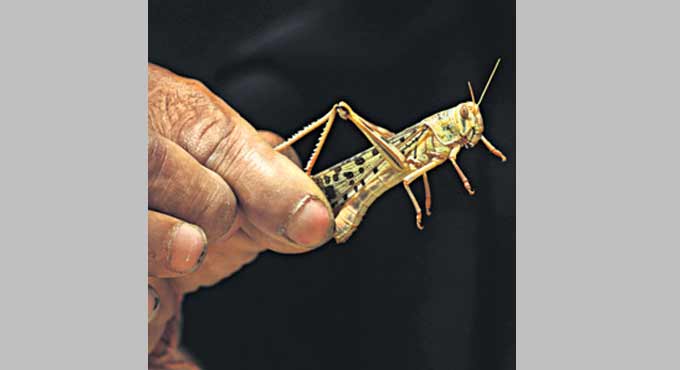
Telangana Today
What is a locust plague?
At a time when India is fighting Covid-19 pandemic, the worst locust attack in 27 years has become an added concern
by Sowmya SangamHyderabad: Over the last few days, a swarm of locusts has been sighted in the urban areas of Rajasthan, Maharashtra and Madhya Pradesh. The locust swarms originated from Africa, the Middle East and Asia, where excess rains triggered a breeding boom. Countries like Ethiopia and Somalia in East Africa have been witnessing locust attacks since ages. However, this year, the African countries are going through one of the worst locust attacks in last 25 years.
The locusts made their way into India from Iran and Pakistan on April 11 and then into Rajasthan. Though these flying insects bite humans, they are the biggest concern for farmers as they can lead to famine and starvation. Usually, locusts arrive in India during the month of July and stay till October along the Pakistan border breeding for one season. However, this year, they have arrived way earlier than expected and due to favourable weather conditions – onset of abnormal monsoon. This year, western Rajasthan received monsoon about six weeks earlier than normal. The usual date is July 1. The early monsoon brought greenery which eventually resulted in locusts crossing the borders and attacking fields in India.
Locusts are insects belonging to grasshopper family named Acrididae. They are capable to travel up to 150 kilometres in a day depending on the wind speed. They can fly for 10 hours per day. Locust swarms devastate crops, destroy pants by their sheer weight, consume leaves, flowers,seeds, fruits, bark and growing plants. Reportedly they can eat 423 million pounds of plants every day. A small swarm of the desert locust eats as much food in one day as about 2,500 people, 10 elephants or 25 camels.
The time when India is already fighting Covid-19 pandemic, the worst locust attack in 27 years has become an added concern. With the population of locusts becoming denser, they form swarms and keep moving around damaging the crops thereby devastating the entire agricultural economy what is commonly referred to as locust plague. According to data by the Union Agriculture Ministry, a swarm of locusts damaged crops worth Rs 10 crore during the 1926-31 plague cycle.
During the 1940-46 and 1949-55 locust plague cycles, the locusts damaged crops worth Rs 2 crore per cycle, and at Rs 50 lakh during the last locust plague cycle in 1959-62. The Indian government is now ordered 60 sprayers from the United Kingdom and also allowed the deployment of drones for controlling locust swarm. The government is also holding consultations with international experts. Awareness campaigns have also been launched across affected states. Pamphlets and stickers are being distributed especially to farmers highlight pest prevention measures. Drones will be used to spray chemicals on breeding sites of the locusts.
So far, the flying insects have affected around 50,000 hectares across states of Rajasthan, Punjab, Gujarat and Madhya Pradesh. According to the United Nations Food and Agricultural Organisation, the locust infestation is likely to get severe by next month. These insects are likely to wipe out tons of food grains and vegetables if the locust attacks continue. The locusts, which are at present sighted 400 km away in Maharashtra, are headed towards Telangana and the state government is all geared up to fight these dreaded insects.
The locusts attack in India has now brought Suriya’s Tamil flick Kaapaan back in discussion. The film had locust attack as its central theme. Another film titled ‘Swarm’ in which ferocious African bees make an entry in America in massive swarms have come into discussion among movie goers. ‘Locust Watch – Desert Locust’ on the Food and Agricultural Organization of United Nations website is one of the websites giving accurate information about the locusts.
Now you can get handpicked stories from Telangana Today on Telegram everyday. Click the link to subscribe.
Click to follow Telangana Today Facebook page and Twitter .